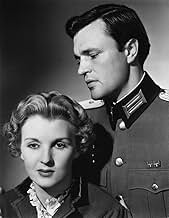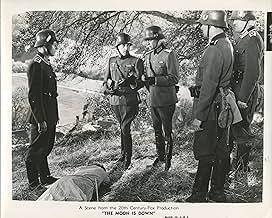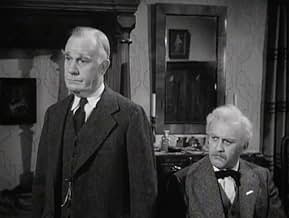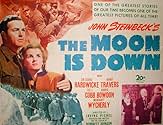Ajouter une intrigue dans votre langueDuring the Nazi occupation of Norway, a small Norwegian village struggles to cope with the invaders and some locals choose collaboration while others prefer armed resistance.During the Nazi occupation of Norway, a small Norwegian village struggles to cope with the invaders and some locals choose collaboration while others prefer armed resistance.During the Nazi occupation of Norway, a small Norwegian village struggles to cope with the invaders and some locals choose collaboration while others prefer armed resistance.
- Prix
- 2 victoires au total
Cedric Hardwicke
- Col. Lanser
- (as Sir Cedric Hardwicke)
Frederic Brunn
- German Soldier
- (as Frederick Brunn)
Ernst Deutsch
- Maj. Hunter
- (as Ernest Dorian)
Ludwig Donath
- Hitler's Voice
- (as Louis Donath)
Richard Abbott
- Villager
- (uncredited)
Louis V. Arco
- Schumann
- (uncredited)
Georgia Backus
- Villager
- (uncredited)
John Banner
- Lt. Prackle
- (uncredited)
Trevor Bardette
- Knute Pierson - Foreman
- (uncredited)
Histoire
Le saviez-vous
- AnecdotesFilmed on the same sets used for the Welsh mining village in Qu'elle était verte ma vallée (1941).
- GaffesMost of the German soldiers are wearing WWI-style Stahlhelm helmets, not the WWII version used from 1935 on. Also, paratroopers (Fallschirmjagers) are shown, but none of the German troops are wearing their helmet - without the projecting visor and flared rim.
- Citations
Lt. Tonder: Last night I dreamed that Hitler was crazy!
- Générique farfeluOpening credits are shown with a hand gesturing to a map of Norway, indicating what is about to take place in the film.
Commentaire en vedette
"Haven't we some little right to life?"
To that question by one of the characters in the Nazi-conquered Norwegian town, actually, no, not when governments say "Fight. Destroy. Kill."
When governments say "You must have a number" and "You must carry this card embossed with that number" or "You must wear this uniform" and "You must kill that other human being," you are being considered as property, and that means you no longer have rights.
At least that is how governments want you to believe.
You are expected to obey, not think. Obey, not have desires of your own. You are a cog in the great machinery of the state.
"The Moon Is Down" was intended specifically as anti-Nazi propaganda, coming as it did shortly after the United States entered World War II, but there is a deeper and more universal meaning.
Even Nazis, or at least German soldiers lured or forced into war by German leaders of the National Socialist German Workers Party, or Nazis, have some vestiges of humanity -- at least some of them.
Told their lives belong to the state, to the fatherland, and that they must act, even die, for purposes of the Master Race, and not to think of or for themselves, still sometimes selfish desires rise to the fore, and such basics as love or freedom motivate more than do orders.
Death and destruction are inevitable results of the subordination of individuals and individuality to the state, to the society, to the race.
Humanity's bloodiest century, the twentieth, proved the truth of that statement with the rise of Nazism and Communism, both of which demanded the submersion of individuals into the mass.
When individual humans no longer matter, mass murders become mere matters of strategy, or "the continuation of politics by other means," as von Clausewitz is quoted.
Few movies illustrate the horror and degradation of war and governments better than "The Moon Is Down," which was presented on Turner Classic Movies the night of 2 January 2017. I had read the John Steinbeck book decades ago and not appreciated that message, not even seen it, that early in my life.
Now, though, after long years lived with the threat of war or some act of tyranny hanging over me nearly every day of that time, I do appreciate the tale and its moral, or at least the moral I now see.
Steinbeck wrote this, a good summation of the meaning of "The Moon Is Down": "Free men cannot start a war, but once it is started, they can fight on in defeat. Herd men, followers of a leader, cannot do that, and so it is always the herd men who win battles and the free men who win wars."
We are engaged on a daily basis in an ongoing war of individualism versus a leader, versus the mob, versus the collective, versus the state, or, especially these last few decades, versus a murderous and destructive movement some try to call a religion.
I would like to recommend "The Moon Is Down" in both book and movie form, not for entertainment, since there is no joy or pleasure in either, but for the object lesson: Do not let politicians and governments control your life.
To that question by one of the characters in the Nazi-conquered Norwegian town, actually, no, not when governments say "Fight. Destroy. Kill."
When governments say "You must have a number" and "You must carry this card embossed with that number" or "You must wear this uniform" and "You must kill that other human being," you are being considered as property, and that means you no longer have rights.
At least that is how governments want you to believe.
You are expected to obey, not think. Obey, not have desires of your own. You are a cog in the great machinery of the state.
"The Moon Is Down" was intended specifically as anti-Nazi propaganda, coming as it did shortly after the United States entered World War II, but there is a deeper and more universal meaning.
Even Nazis, or at least German soldiers lured or forced into war by German leaders of the National Socialist German Workers Party, or Nazis, have some vestiges of humanity -- at least some of them.
Told their lives belong to the state, to the fatherland, and that they must act, even die, for purposes of the Master Race, and not to think of or for themselves, still sometimes selfish desires rise to the fore, and such basics as love or freedom motivate more than do orders.
Death and destruction are inevitable results of the subordination of individuals and individuality to the state, to the society, to the race.
Humanity's bloodiest century, the twentieth, proved the truth of that statement with the rise of Nazism and Communism, both of which demanded the submersion of individuals into the mass.
When individual humans no longer matter, mass murders become mere matters of strategy, or "the continuation of politics by other means," as von Clausewitz is quoted.
Few movies illustrate the horror and degradation of war and governments better than "The Moon Is Down," which was presented on Turner Classic Movies the night of 2 January 2017. I had read the John Steinbeck book decades ago and not appreciated that message, not even seen it, that early in my life.
Now, though, after long years lived with the threat of war or some act of tyranny hanging over me nearly every day of that time, I do appreciate the tale and its moral, or at least the moral I now see.
Steinbeck wrote this, a good summation of the meaning of "The Moon Is Down": "Free men cannot start a war, but once it is started, they can fight on in defeat. Herd men, followers of a leader, cannot do that, and so it is always the herd men who win battles and the free men who win wars."
We are engaged on a daily basis in an ongoing war of individualism versus a leader, versus the mob, versus the collective, versus the state, or, especially these last few decades, versus a murderous and destructive movement some try to call a religion.
I would like to recommend "The Moon Is Down" in both book and movie form, not for entertainment, since there is no joy or pleasure in either, but for the object lesson: Do not let politicians and governments control your life.
- morrisonhimself
- 1 janv. 2017
- Lien permanent
Meilleurs choix
Connectez-vous pour évaluer et surveiller les recommandations personnalisées
- How long is The Moon Is Down?Propulsé par Alexa
Détails
- Date de sortie
- Pays d’origine
- Langue
- Aussi connu sous le nom de
- Se ha puesto la luna
- Lieux de tournage
- société de production
- Consultez plus de crédits d'entreprise sur IMDbPro
- Durée1 heure 30 minutes
- Couleur
- Rapport de forme
- 1.37 : 1
Contribuer à cette page
Suggérer une modification ou ajouter du contenu manquant

Lacune principale
By what name was The Moon Is Down (1943) officially released in India in English?
Répondre




















